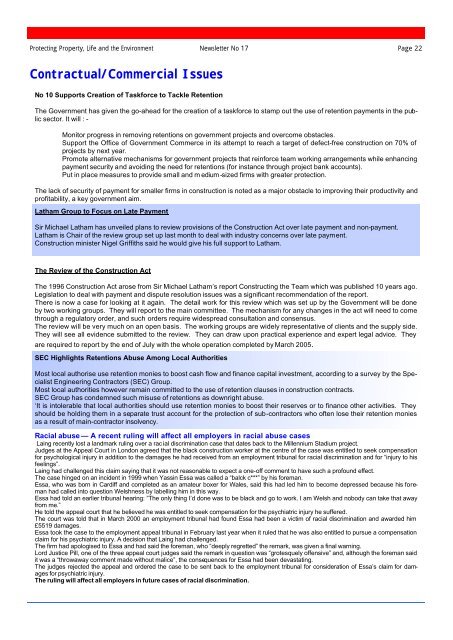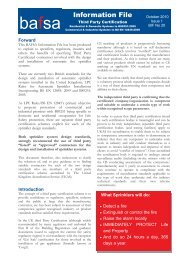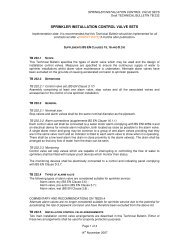Sprinkler News - Bafsa
Sprinkler News - Bafsa
Sprinkler News - Bafsa
You also want an ePaper? Increase the reach of your titles
YUMPU automatically turns print PDFs into web optimized ePapers that Google loves.
Protecting Property, Life and the Environment <strong>News</strong>letter No 17 Page 22<br />
Contractual/Commercial Issues<br />
No 10 Supports Creation of Taskforce to Tackle Retention<br />
The Government has given the go-ahead for the creation of a taskforce to stamp out the use of retention payments in the public<br />
sector. It will : -<br />
Monitor progress in removing retentions on government projects and overcome obstacles.<br />
Support the Office of Government Commerce in its attempt to reach a target of defect-free construction on 70% of<br />
projects by next year.<br />
Promote alternative mechanisms for government projects that reinforce team working arrangements while enhancing<br />
payment security and avoiding the need for retentions (for instance through project bank accounts).<br />
Put in place measures to provide small and m edium -sized firms with greater protection.<br />
The lack of security of payment for smaller firms in construction is noted as a major obstacle to improving their productivity and<br />
profitability, a key government aim.<br />
Latham Group to Focus on Late Payment<br />
Sir Michael Latham has unveiled plans to review provisions of the Construction Act over late payment and non-payment.<br />
Latham is Chair of the review group set up last month to deal with industry concerns over late payment.<br />
Construction minister Nigel Griffiths said he would give his full support to Latham.<br />
The Review of the Construction Act<br />
The 1996 Construction Act arose from Sir Michael Latham’s report Constructing the Team which was published 10 years ago.<br />
Legislation to deal with payment and dispute resolution issues was a significant recommendation of the report.<br />
There is now a case for looking at it again. The detail work for this review which was set up by the Government will be done<br />
by two working groups. They will report to the main committee. The mechanism for any changes in the act will need to come<br />
through a regulatory order, and such orders require widespread consultation and consensus.<br />
The review will be very much on an open basis. The working groups are widely representative of clients and the supply side.<br />
They will see all evidence submitted to the review. They can draw upon practical experience and expert legal advice. They<br />
are required to report by the end of July with the whole operation completed by March 2005.<br />
SEC Highlights Retentions Abuse Among Local Authorities<br />
Most local authorise use retention monies to boost cash flow and finance capital investment, according to a survey by the Specialist<br />
Engineering Contractors (SEC) Group.<br />
Most local authorities however remain committed to the use of retention clauses in construction contracts.<br />
SEC Group has condemned such misuse of retentions as downright abuse.<br />
‘It is intolerable that local authorities should use retention monies to boost their reserves or to finance other activities. They<br />
should be holding them in a separate trust account for the protection of sub-contractors who often lose their retention monies<br />
as a result of main-contractor insolvency.<br />
Racial abuse — A recent ruling will affect all employers in racial abuse cases<br />
Laing recently lost a landmark ruling over a rac ial discrimination case that dates back to the Millennium Stadium project.<br />
Judges at the Appeal Court in London agreed that the black construction worker at the centre of the case was entitled to seek compensation<br />
for psychological injury in addition to the damages he had received from an employment tribunal for racial discrimination and for “injury to his<br />
feelings”.<br />
Laing had challenged this claim saying that it was not reasonable to expect a one-off comment to have such a profound effect.<br />
The case hinged on an incident in 1999 when Yassin Essa was called a “balck c***” by his foreman.<br />
Essa, who was born in Cardiff and completed as an amateur boxer for Wales, said this had led him to become depressed because his foreman<br />
had called into question Welshness by labelling him in this way.<br />
Essa had told an earlier tribunal hearing: ”The only thing I’d done was to be black and go to work. I am Welsh and nobody can take that away<br />
from me.”<br />
He told the appeal court that he believed he was entitled to seek compensation for the psychiatric injury he suffered.<br />
The court was told that in March 2000 an employment tribunal had found Essa had been a victim of racial discrimination and awarded him<br />
£5519 damages.<br />
Essa took the case to the employment appeal tribunal in February last year when it ruled that he was also entitled to pursue a compensation<br />
claim for his psychiatric injury. A decision that Laing had challenged.<br />
The firm had apologised to Essa and had said the foreman, who “deeply regretted” the remark, was given a final warning.<br />
Lord Justice Pill, one of the three appeal court judges said the remark in question was “grotesquely offensive” and, although the foreman said<br />
it was a “throwaway comment made without malice”, the consequences for Essa had been devastating.<br />
The judges rejected the appeal and ordered the case to be sent back to the employment tribunal for consideration of Essa’s claim for damages<br />
for psychiatric injury.<br />
The ruling will affect all employers in future cases of racial discrimination.
















